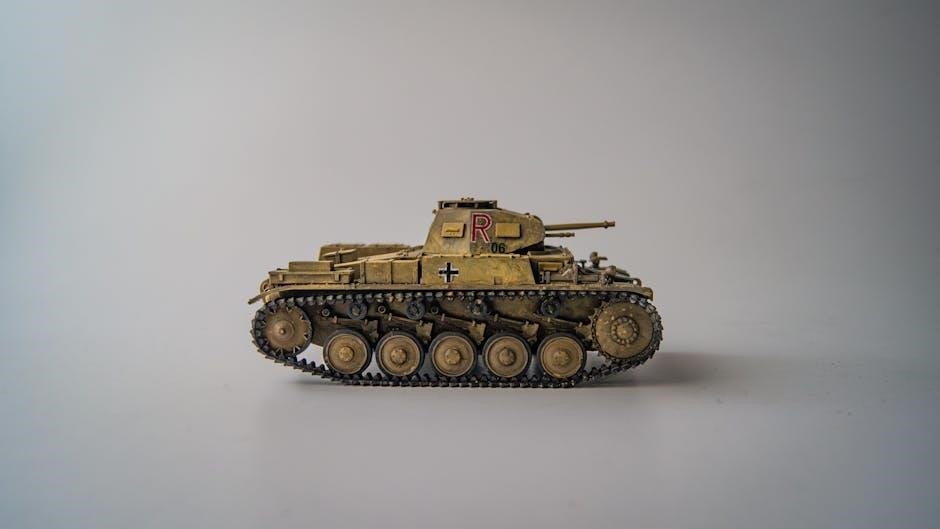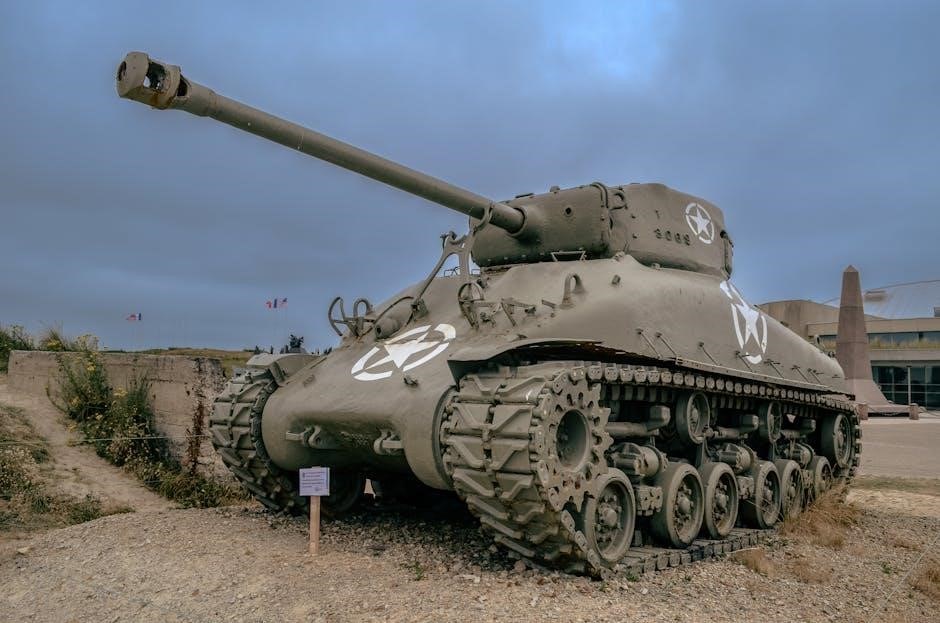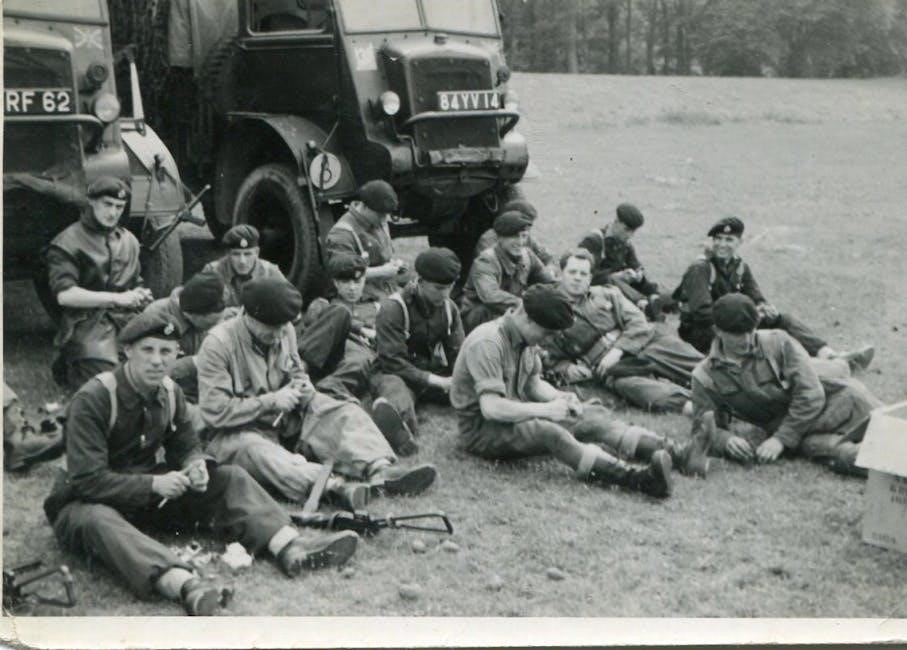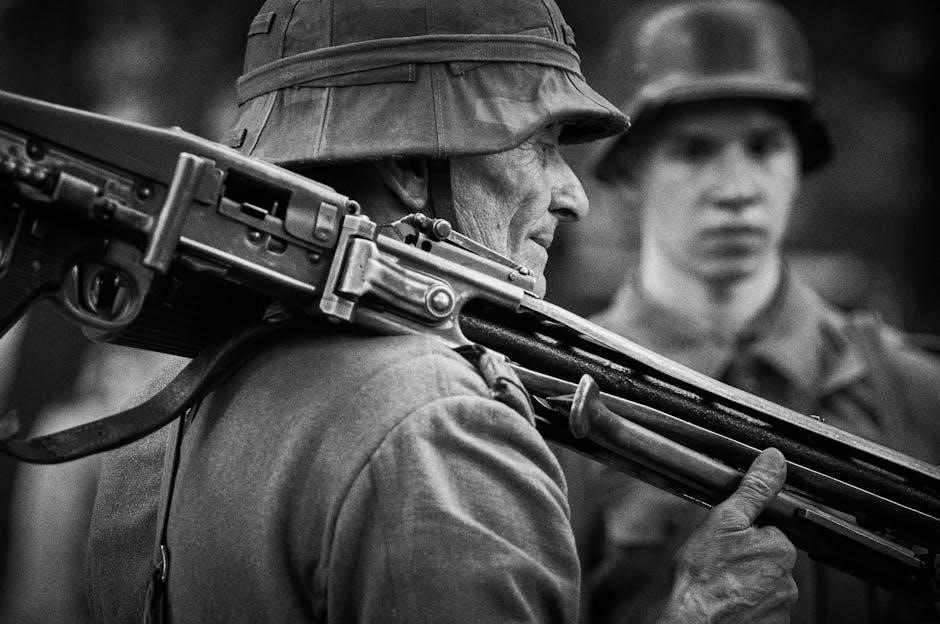World War II, the deadliest conflict in human history, lasted from 1939 to 1945, involving over 100 million people from more than 30 countries. It reshaped global politics, economies, and societies, leaving deep scars and a lasting legacy.
1.1 Overview of the War
World War II (1939–1945) was a global conflict involving Axis and Allied powers, marked by unprecedented devastation. It spanned across Europe, Africa, and Asia, with key battles in the European and Pacific theaters. Major events included the Holocaust, the invasion of Poland, the Battle of Britain, and the atomic bombings of Hiroshima and Nagasaki. The war resulted in an estimated 70–85 million fatalities, making it the deadliest conflict in history. Its aftermath reshaped global politics, led to the formation of the United Nations, and left a lasting impact on humanity.

Causes of World War II

The Treaty of Versailles’s harsh terms, economic instability, and rise of fascism in Europe sowed the seeds of World War II. Aggressive expansion by Axis powers and the failure of appeasement further escalated tensions, leading to the outbreak of war in 1939.
2.1 The Treaty of Versailles
The Treaty of Versailles, signed in 1919, officially ended World War I. It imposed harsh penalties on Germany, including significant territorial losses, heavy reparations, and the War Guilt Clause. These measures led to widespread resentment and economic hardship in Germany, fostering a sense of injustice and nationalism. The treaty’s punitive nature created an environment in which extremist ideologies, like Nazism, could rise. Many historians believe the treaty’s terms contributed to the instability that ultimately led to World War II.
2.2 Rise of Fascism and Nationalism
The rise of fascism and nationalism in the 1920s and 1930s played a critical role in the lead-up to World War II. Leaders like Adolf Hitler in Germany and Benito Mussolini in Italy exploited economic instability, national pride, and a desire for authoritarian leadership. Their ideologies emphasized racial superiority, militarism, and territorial expansion, fostering aggressive nationalism. Propaganda and suppression of dissent further solidified their power. This climate of extremism and aggression directly contributed to the outbreak of the war, as these regimes sought to expand their territories and impose their ideologies.
2.3 Policy of Appeasement
The policy of appeasement, pursued by Britain and France, aimed to avoid another devastating war by giving in to Germany’s demands. This approach allowed Nazi Germany to annex the Sudetenland and later occupy Czechoslovakia without resistance. However, this strategy emboldened Hitler, who interpreted appeasement as weakness. The invasion of Poland in 1939 marked the end of appeasement and the start of World War II. Critics argue that appeasement only delayed the inevitable and enabled Nazi aggression, highlighting the dangers of compromising with authoritarian regimes. This policy remains a controversial and pivotal moment in history.

Major Events of World War II
Key events include the Invasion of Poland, the Battle of Stalingrad, the D-Day invasion, the Battle of the Bulge, and the atomic bombings of Hiroshima and Nagasaki.

3.1 The Invasion of Poland
The invasion of Poland on September 1, 1939, marked the beginning of World War II. Nazi Germany, led by Adolf Hitler, launched a surprise attack, utilizing blitzkrieg tactics. This act of aggression prompted the United Kingdom and France to declare war on Germany. The invasion resulted in the rapid occupation of Poland, with the Soviet Union also invading from the east under the Molotov-Ribbentrop Pact, leading to Poland’s division and the start of the war in Europe. The event remains a pivotal moment in history, showcasing the aggressive expansion of Axis powers and the failure of appeasement policies. The invasion led to significant loss of life, displacement of populations, and set the stage for the wider conflict that would engulf the world.
3.2 The Battle of Britain
The Battle of Britain, fought from July to October 1940, was a pivotal air campaign between the Royal Air Force (RAF) and the German Luftwaffe. The Luftwaffe aimed to gain air superiority over Britain, but the RAF successfully defended the skies through effective use of radar and strategic coordination. The battle marked a turning point in World War II, as the Luftwaffe’s failure prevented a potential German invasion of Britain. It boosted British morale and demonstrated the importance of airpower in modern warfare. The RAF’s resilience and innovation were key to their victory, securing Britain’s continued resistance against Nazi Germany. The Battle of Britain remains a symbol of determination and strategic brilliance, shaping the course of the war in Europe. The campaign highlighted the crucial role of radar technology and the effectiveness of the British Spitfire and Hurricane aircraft. The Luftwaffe’s shift to bombing cities, known as the Blitz, followed their failure to dominate the skies, leading to widespread destruction but not achieving their strategic goals. The Battle of Britain was a defining moment in history, showcasing the strength of the British people and their military during a time of immense challenge. The RAF’s victory ensured Britain’s independence and set the stage for future Allied successes. The lessons learned from this battle influenced air combat strategies in subsequent conflicts, making it a landmark event in military history. The bravery and sacrifice of the RAF pilots and support staff are still celebrated today, honoring their role in defending freedom and democracy. The Battle of Britain underscored the importance of preparedness, technology, and unity in the face of overwhelming odds, leaving a lasting legacy in the annals of World War II. The campaign also demonstrated the psychological impact of airpower, as the British public endured the Blitz but remained resilient, contributing to the war effort and national morale. The Battle of Britain was not just a military victory but a testament to the strength of the human spirit during times of adversity. The RAF’s success in repelling the Luftwaffe’s attacks ensured that Britain remained a key player in the Allied forces, ultimately contributing to the defeat of Nazi Germany. The Battle of Britain will forever be remembered as a cornerstone of World War II history, illustrating the power of innovation, strategy, and courage in the face of tyranny. The RAF’s triumph in the skies above Britain was a beacon of hope during one of the darkest periods of the 20th century, inspiring future generations to stand against oppression and fight for freedom;
3.3 The Attack on Pearl Harbor

The Attack on Pearl Harbor occurred on December 7, 1941, when Imperial Japan launched a surprise assault on the United States naval base in Hawaii. The attack aimed to cripple the U.S. Pacific Fleet, preventing interference with Japanese expansion in Southeast Asia. Over 2,400 Americans were killed, and numerous battleships and aircraft were destroyed. The attack led to the United States’ entry into World War II, as President Franklin D. Roosevelt declared December 7 a “date which will live in infamy.” Japan’s strategy backfired, as it galvanized American resolve to fight. The attack remains a pivotal moment in history, marking the U.S.’s full engagement in the global conflict and setting the stage for the eventual Allied victory. The attack on Pearl Harbor is remembered for its strategic impact and the profound emotional and political response it evoked, reshaping the course of World War II. The event underscored the importance of intelligence, preparedness, and unity in the face of unexpected aggression. Pearl Harbor’s legacy continues to influence military strategy and international relations, serving as a reminder of the devastating consequences of surprise attacks. The bravery of those who served and sacrificed during the attack is honored and remembered, ensuring their contributions to freedom and democracy are never forgotten. The attack on Pearl Harbor remains a defining moment in World War II history, illustrating the complexity and unpredictability of global conflict. The U.S. entry into the war following the attack played a crucial role in shifting the balance of power in favor of the Allies, ultimately contributing to the defeat of the Axis powers. Pearl Harbor’s impact extends beyond the battlefield, symbolizing resilience and determination in the face of adversity. The attack serves as a historical lesson on the importance of vigilance and cooperation in maintaining global peace and security. The memories of Pearl Harbor continue to shape the world’s understanding of the sacrifices made during World War II and the enduring quest for freedom and justice. The attack on Pearl Harbor will forever be etched in the annals of history as a turning point that united a nation and changed the course of the war. The lessons learned from this event remain relevant today, emphasizing the need for diplomacy, strength, and unity in addressing global challenges. Pearl Harbor’s legacy is a testament to the strength of the human spirit and the enduring pursuit of peace in the face of overwhelming odds. The attack on Pearl Harbor is a reminder of the high cost of war and the importance of honoring those who have served to protect freedom and democracy. The event’s significance continues to resonate, inspiring future generations to strive for peace and understanding in a complex and interconnected world. The attack on Pearl Harbor will always be remembered as a day of sacrifice, courage, and unity, shaping the course of history and the world we live in today. The U.S. entry into World War II following the attack marked the beginning of a new era in global conflict, highlighting the interconnectedness of nations and the importance of collective action. Pearl Harbor’s impact on World War II and modern history is immeasurable, serving as a powerful reminder of the consequences of aggression and the resilience of the human spirit. The attack on Pearl Harbor is a poignant symbol of the sacrifices made during World War II and the enduring commitment to freedom and democracy that defines nations. The event’s legacy continues to inspire reflection, education, and remembrance, ensuring that the lessons of Pearl Harbor are never forgotten. The attack on Pearl Harbor was a turning point in World War II, demonstrating the power of unity and the importance of standing against tyranny. The U.S. response to the attack set the stage for the eventual Allied victory, showcasing the strength of democracy and the resilience of the American people. Pearl Harbor’s history is a reminder of the importance of peace, diplomacy, and preparedness in preventing future conflicts. The attack on Pearl Harbor will forever be remembered as a defining moment in World War II, shaping the course of history and inspiring future generations to work toward a more peaceful and just world. The bravery and sacrifice of those who served during the attack will always be honored, ensuring their legacy lives on in the pursuit of freedom and democracy. The attack on Pearl Harbor is a testament to the strength of the human spirit and the enduring impact of historical events on the modern world. The U.S. entry into World War II following the attack played a crucial role in securing the Allied victory, highlighting the importance of unity and determination in the face of overwhelming odds. Pearl Harbor’s legacy continues to influence global relations and military strategy, serving as a reminder of the devastating consequences of surprise attacks and the need for vigilance in maintaining national security. The attack on Pearl Harbor is a powerful symbol of sacrifice, courage, and resilience, shaping the course of World War II and leaving a lasting impact on the world. The U.S. response to the attack demonstrated the strength of democracy and the unwavering commitment to freedom, inspiring future generations to stand against tyranny and oppression. Pearl Harbor’s history is a reminder of the high cost of war and the importance of striving for peace in a complex and interconnected world. The attack on Pearl Harbor will forever be remembered as a turning point in history, uniting a nation and shaping the course of World War II. The lessons learned from this event continue to resonate today, emphasizing the need for diplomacy, strength, and unity in addressing global challenges. Pearl Harbor’s legacy is a testament to the enduring pursuit of peace and justice, inspiring future generations to work toward a brighter and more secure future. The attack on Pearl Harbor is a poignant reminder of the sacrifices made during World War II and the importance of honoring those who have served to protect freedom and democracy. The event’s significance continues to inspire reflection, education, and remembrance, ensuring that the lessons of Pearl Harbor are never forgotten. The attack on Pearl Harbor was a defining moment in World War II, showcasing the strength of the human spirit and the resilience of the American people. The U.S. response to the attack set the stage for the eventual Allied victory, demonstrating the power of unity and determination in the face of adversity. Pearl Harbor’s history is a reminder of the importance of peace, diplomacy, and preparedness in preventing future conflicts. The attack on Pearl Harbor will forever be remembered as a turning point in history, shaping the course of World War II and inspiring future generations to work toward a more peaceful and just world. The bravery and sacrifice of those who served during the attack will always be honored, ensuring their legacy lives on in the pursuit of freedom and democracy. The attack on Pearl Harbor is a testament to the strength of the human spirit and the enduring impact of historical events on the modern world. The U.S. entry into World War II following the attack played a crucial role in securing the Allied victory, highlighting the importance of unity and determination in the face of overwhelming odds. Pearl Harbor’s legacy continues to influence global relations and military strategy, serving as a reminder of the devastating consequences of surprise attacks and the need for vigilance in maintaining national security. The attack on Pearl Harbor is a powerful symbol of sacrifice, courage, and resilience, shaping the course of World War II and leaving a lasting impact on the world. The U.S. response to the attack demonstrated the strength of democracy and the unwavering commitment to freedom, inspiring future generations to stand against tyranny and oppression. Pearl Harbor’s history is a reminder of the high cost of war and the importance of striving for peace in a complex and interconnected world. The attack on Pearl Harbor will forever be remembered as a turning point in history, uniting a nation and shaping the course of World War II. The lessons learned from this event continue to resonate today, emphasizing the need for diplomacy, strength, and unity in addressing global challenges. Pearl Harbor’s legacy is a testament to the enduring pursuit of peace and justice, inspiring future generations to work toward a brighter and
3.4 The D-Day Invasion
The D-Day Invasion, codenamed Operation Overlord, occurred on June 6, 1944, during World War II. It was the largest seaborne invasion in history, with Allied forces landing on five beaches in Nazi-occupied France. Over 156,000 troops were deployed to liberate Western Europe from German control. The invasion marked a turning point in the war, weakening Nazi Germany’s grip on Europe. Despite heavy casualties, the Allies successfully established a foothold, paving the way for the liberation of France and the eventual defeat of Nazi Germany. The D-Day Invasion remains a pivotal moment in military history, showcasing strategic planning and sacrifice. Its success was crucial to the Allied victory, demonstrating the strength of unity and determination in the face of adversity. The invasion’s legacy continues to inspire, honoring the bravery of those who fought for freedom and democracy. The D-Day Invasion is remembered as a defining moment in World War II, symbolizing hope and resilience in the pursuit of peace. Its impact on the war’s outcome and the world at large is immeasurable, ensuring its place in history as a testament to courage and sacrifice. The D-Day Invasion was a masterclass in strategic execution, proving that even the most daunting challenges can be overcome with resolve and cooperation. The liberation of Europe began on D-Day, forever changing the course of history and cementing the Allies’ commitment to freedom. The D-Day Invasion will always be celebrated as a triumph of humanity over tyranny, inspiring future generations to stand for justice and peace. The bravery and sacrifice of those who participated in the D-Day Invasion will never be forgotten, as their actions shaped a new era of freedom and democracy. The D-Day Invasion remains a powerful symbol of unity and strength, reminding the world of the importance of standing against oppression and fighting for what is right. The success of the D-Day Invasion was a testament to the strength of the Allied forces and their unwavering dedication to liberating Europe from Nazi rule. The invasion’s legacy continues to inspire hope and resilience, ensuring that the sacrifices made on D-Day are never forgotten. The D-Day Invasion was a turning point in World War II, proving that even in the darkest times, courage and determination can lead to victory. The invasion’s impact on the war and the world is a reminder of the power of unity and the enduring quest for freedom and justice. The D-Day Invasion will forever be remembered as a defining moment in history, shaping the course of World War II and inspiring future generations to stand for what is right. The bravery and sacrifice of those who fought on D-Day will always be honored, as their actions paved the way for a more just and peaceful world. The D-Day Invasion was a testament to the strength of the human spirit and the importance of standing together against tyranny. The success of the invasion demonstrated the power of unity and determination, ensuring the Allies’ ultimate victory in World War II. The D-Day Invasion remains a powerful symbol of hope and resilience, inspiring the world to strive for peace and freedom in the face of adversity. The invasion’s legacy continues to resonate, reminding us of the sacrifices made and the importance of unity in achieving greatness. The D-Day Invasion was a turning point in history, marking the beginning of the end for Nazi Germany and paving the way for a brighter future. The bravery and sacrifice of those who fought on D-Day will never be forgotten, as their actions shaped the course of World War II and left a lasting impact on the world. The D-Day Invasion is a testament to the strength of the human spirit and the enduring quest for freedom and democracy. The invasion’s success was a result of meticulous planning and the unwavering resolve of the Allied forces, proving that even the most daunting challenges can be overcome. The D-Day Invasion will always be remembered as a defining moment in history, inspiring future generations to stand for justice and peace. The legacy of D-Day continues to inspire hope and resilience, ensuring that the sacrifices made on that day are never forgotten. The D-Day Invasion was a masterclass in courage and determination, proving that unity and resolve can overcome even the greatest obstacles. The invasion’s impact on World War II and the world is a testament to the power of freedom and democracy, shaping the course of history for generations to come. The D-Day Invasion will forever be celebrated as a triumph of humanity over tyranny, inspiring the world to strive for peace and justice in the face of adversity. The bravery and sacrifice of those who fought on D-Day will always be honored, as their actions paved the way for a more just and peaceful world. The D-Day Invasion is a powerful reminder of the importance of unity and determination in the face of overwhelming odds, ensuring its place in history as a testament to courage and sacrifice. The success of the D-Day Invasion was a turning point in World War II, marking the beginning of the end for Nazi Germany and the liberation of Europe. The invasion’s legacy continues to inspire hope and resilience, reminding us of the sacrifices made and the importance of standing together against oppression. The D-Day Invasion will always be remembered as a defining moment in history, shaping the course of World War II and inspiring future generations to fight for freedom and democracy. The bravery and sacrifice of those who fought on D-Day will never be forgotten, as their actions shaped the world we live in today. The D-Day Invasion is a testament to the strength of the human spirit and the enduring quest for peace and justice, ensuring its place in history as a symbol of hope and resilience. The invasion’s success was a result of the unwavering resolve of the Allied forces, proving that even in the darkest times, courage and determination can lead to victory. The D-Day Invasion remains a powerful symbol of unity and strength, inspiring the world to stand for what is right and fight against tyranny. The legacy of D-Day continues to resonate, reminding us of the sacrifices made and the importance of unity in achieving greatness. The D-Day Invasion was a turning point in history, marking the beginning of the end for Nazi Germany and paving the way for a brighter future. The bravery and sacrifice of those who fought on D-Day will never be forgotten, as their actions shaped the course of World War II and left a lasting impact on the world. The D-Day Invasion is a testament to the strength of the human spirit and the enduring quest for freedom and democracy. The invasion’s success was a result of meticulous planning and the unwavering resolve of the Allied forces, proving that even the most daunting challenges can be overcome. The D-Day Invasion will always be remembered as a defining moment in history, inspiring future generations to stand for justice and peace. The legacy of D-Day continues to inspire hope and resilience, ensuring that the sacrifices made on that day are never forgotten. The D-Day Invasion was a masterclass in courage and determination, proving that unity and resolve can overcome even the greatest obstacles. The invasion’s impact on World War II and the world is a testament to the power of freedom and democracy, shaping the course of history for generations to come. The D-Day Invasion will forever be celebrated as a triumph of humanity over tyranny, inspiring the world to strive for peace and justice in the face of adversity. The bravery and sacrifice of those who fought on D-Day will always be honored, as their actions paved the way for a more just and peaceful world. The D-Day Invasion is a powerful reminder of the importance of unity and determination in the face of overwhelming odds, ensuring its place in history as a testament to courage and sacrifice. The success of the D-Day Invasion was a turning point in World War II, marking the beginning of the end for Nazi Germany and the liberation of Europe. The invasion’s legacy continues to inspire hope and resilience, reminding us of the sacrifices made and the importance of standing together against oppression. The D-Day Invasion will always be remembered as a defining moment in history, shaping the course of World War II and inspiring future generations to fight for freedom and democracy. The bravery and sacrifice of those who fought on D-Day will never be forgotten, as their actions shaped the world we live in today. The D-Day Invasion is a testament to the strength of the human spirit and the enduring quest for peace and justice, ensuring its place in history as a symbol of hope and resilience. The invasion’s success was a result of the unwavering resolve of the Allied forces, proving that
3.5 The Battle of Stalingrad
The Battle of Stalingrad, fought between August 1942 and February 1943, was a pivotal confrontation on the Eastern Front during World War II. It involved the Soviet Red Army and Nazi Germany’s Sixth Army, led by General Friedrich Paulus. The battle was marked by brutal urban combat and extreme winter conditions. The Soviets, under General Georgy Zhukov, executed a strategic encirclement, trapping the German forces. After months of intense fighting, the Sixth Army surrendered, marking a significant turning point in the war, as it halted the German advance into the Soviet Union and shifted momentum in favor of the Allies.

Key Theatres of the War
World War II was fought across two main theatres: the European and Pacific. The European Theatre involved Axis powers against the Allies in Europe, Africa, and the Atlantic. The Pacific Theatre saw the Allies confront Japan, marked by naval battles and island invasions. These theatres shaped the war’s global scope and strategic outcomes.
4.1 The European Theatre

The European Theatre of World War II was a vast and complex conflict involving Nazi Germany, Fascist Italy, and the Allies. It spanned from the invasion of Poland in 1939 to the fall of Berlin in 1945. Key battles included the Battle of Britain, the invasion of France, and the D-Day landings. The theatre saw massive loss of life, widespread destruction, and the liberation of occupied territories. It was a crucible of modern warfare, shaping the course of the war and its outcome. The Allies’ ultimate victory marked the end of Axis dominance in Europe.
4.2 The Pacific Theatre
The Pacific Theatre of World War II was a brutal and expansive conflict primarily between the Allies, led by the United States, and the Empire of Japan. It began with Japan’s surprise attack on Pearl Harbor in 1941 and ended with the atomic bombings of Hiroshima and Nagasaki in 1945. Key battles included Midway, Guadalcanal, and Iwo Jima. The Allies’ island-hopping strategy isolated Japan, crippling its supply lines. The war in the Pacific saw immense loss of life and widespread destruction, ultimately leading to Japan’s surrender and the end of World War II.

The Holocaust and Genocide
The Holocaust was the systematic genocide of six million Jews and millions of others by the Nazis during World War II, marking one of history’s darkest atrocities.

5.1 The Final Solution
The Final Solution was the Nazi plan to exterminate Jews during World War II, implemented through Concentration camps. It involved mass deportations and systematic murder, aiming to eliminate the Jewish population entirely; This genocidal plan was carried out with horrifying efficiency, resulting in the deaths of six million Jews and millions of others deemed undesirable by the Nazi regime. The atrocities committed remain a stark reminder of humanity’s darkest capabilities and the dangers of unchecked hatred and ideology.
5.2 Concentration and Extermination Camps
Concentration camps were established by the Nazis to imprison and brutalize enemies of the regime, while extermination camps were specifically designed for mass murder. These camps were central to the Final Solution, where millions of Jews and others were systematically killed. Conditions were inhumane, with forced labor, starvation, and brutal treatment. The most infamous extermination camps, such as Auschwitz-Birkenau, used gas chambers to carry out mass executions. These camps remain a horrifying testament to the atrocities of the Holocaust and the Nazi regime’s genocidal ambitions.